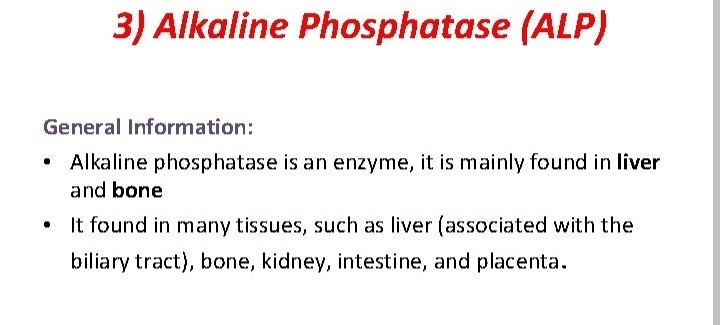You have alkaline phosphatase all over your body, including your liver, digestive system, kidneys, and bones.
If you have signs of liver or bone disease, your doctor may order an alkaline phosphatase (ALP) test to measure the amount of enzymes in your blood and help diagnose the problem.
Sometimes it is part of a broader group of tests that check how the liver is functioning, called a regular liver or liver panel.
Why should I take this test?
If her liver is not working properly, she may have high levels of ALP in her blood. Doctors often use this test to check for blocked bile ducts. Other conditions that can cause liver problems include:
• liver cancer
• cirrhosis
• hepatitis
• blocked bile ducts
This test can also detect bone problems such as:
• Paget's disease, which affects bone growth
• Problems caused by vitamin D deficiency
Interpretation of test results It is given in units (IU/l). .
The report may also include reference ranges that may vary from lab to lab. A common reference range is 44-147 IU/L, although some professional bodies recommend a range of 30-120 IU/L. For this reason, it is important to check test reports against the reference range of the lab that analyzed the samples.
Elevated ALP can indicate many other conditions besides liver and bone disease. However, high ALP values are not necessarily a sign of a problem.
Several factors may be considered when interpreting test results. For example, ALP is usually higher in pregnant women, growing children and adolescents, and the elderly. ALP produced in the gut can also increase after fatty meals in people with certain blood types. It can be caused by nutritional deficiencies, hypothyroidism, and some rare genetic disorders that affect ALP or liver function. Persistent low levels of ALP may indicate hypophosphatasia (HPP), a rare genetic disorder of bone metabolism.
If there is an ALP isozyme test, the test report will show values for different types of ALP. Elevation of specific ALP sources can localize tissue damage and other diseases in the body.
Regardless of the type of ALP test you have, it is important to discuss your test results with your doctor. Your doctor can best explain what your test results mean for your health and whether other tests might be beneficial.
When discussing test results with your doctor, these questions may help you better understand your situation and the most appropriate next steps in treatment:

